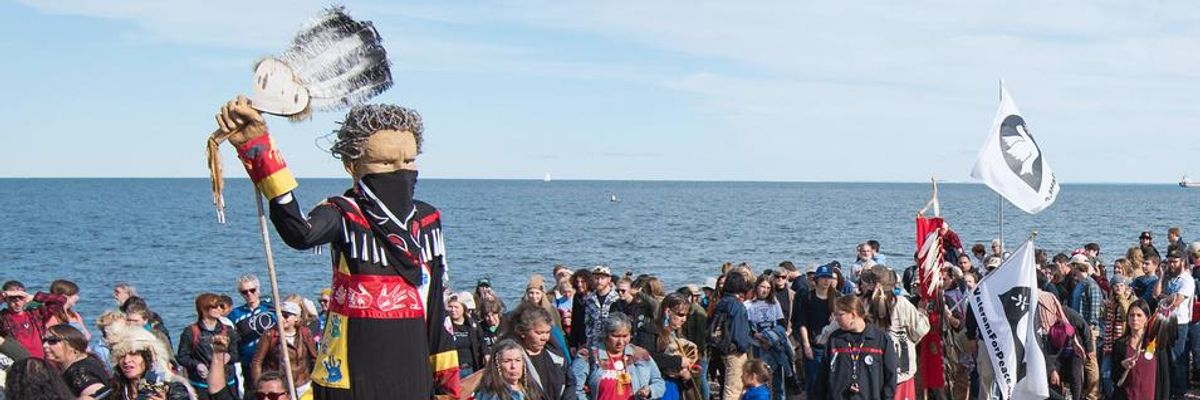Indigenous-led water protectors on Friday engaged in multiple direct actions against Enbridge's highly controversial Line 3 tar sands pipeline in Minnesota, on the same day that state regulators denied a request from two tribes to stop the Canadian company from proceeding with the project.
"Clean water and unpolluted land capable of providing sustenance is essential to our survival... [and] Line 3 poses an existential threat to our well-being."
--Minnesota Chippewa Tribe
Water protectors blocked pipeline traffic and climbed and occupied trees as part of Friday's actions. Urging other Indigenous peoples and allies to "take a stand," the Anishinaabe activists at one of the protests told other Native Americans that "your ancestors are here too."
"Take a moment to speak to her, our Mother Earth is crying out for the warriors to rise again," they said. "Strong hearts to the front!"
In a statement, Line 3 Media Collective said that the pipeline "violates the treaty rights of Anishinaabe peoples by endangering critical natural resources in the 1854, 1855, and 1867 treaty areas, where the Ojibwe have the right to hunt, fish, gather medicinal plants, harvest wild rice, and preserve sacred sites."
"The state of Minnesota does not have the consent of many tribes that will be impacted by construction and spills," the group added. "Last week, the Red Lake Band of Chippewa and the White Earth Band petitioned the Minnesota Public Utilities Commission to pause its approval of Line 3 construction while challenges to the permits are considered by the Minnesota Court of Appeals."
On Friday, the MPUC voted 4-1 to reject the tribes' request. According to the Washington Post, the commissioners said that further delays would hurt workers who had traveled to northern Minnesota. They also cited Democratic Gov. Tim Walz's designation of the project as "critical" during the coronavirus pandemic.
On Thursday, the Minnesota Chippewa Tribe (MCT) appealed directly to Walz:
Indian people have lived along the lakes, rivers, and streams of northern Minnesota since time immemorial. The people of the MCT have flourished in the area for centuries due to the careful conservation of our resources. Clean water and unpolluted land capable of providing sustenance is essential to our survival... [and] Line 3 poses an existential threat to our well-being.
The vote and the water protectors' latest act of resistance come just two days after construction began on the $2.9 billion, 1,100-mile extension.
According to Indigenous-led environmental group Honor the Earth, the pipeline will have the daily capacity to transport 760,000 barrels of tar sands oil--known as the world's dirtiest fuel--from Alberta, Canada to a port in Superior, Wisconsin. Stop Line 3 says the pipeline will run "through untouched wetlands and the treaty territory of Anishinaabe peoples."
"We have the right to practice our treaty rights," stressed Gitchigumi Scout member Taysha Martineau, one of the Indigenous leaders at the Friday action. "We ask you to bear witness and protect our right to do so."




